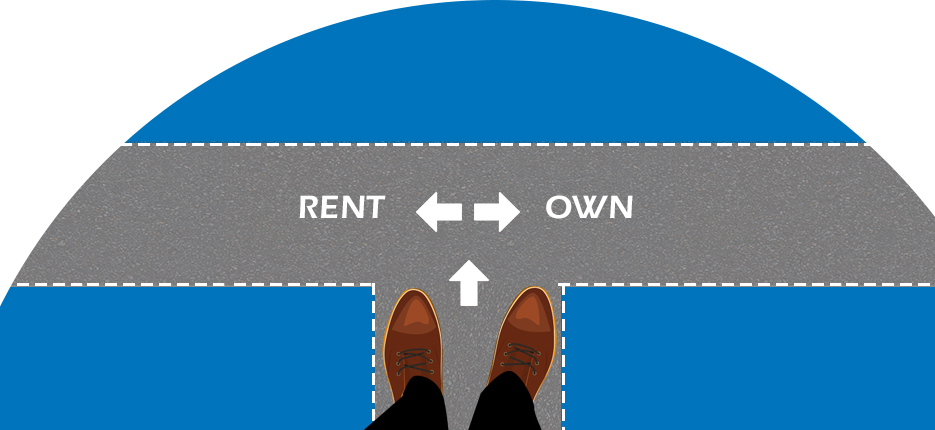Rented House v/s Owned House – An Age-Old Question
hffc • September 18, 2019

Remember a proverbial quote — “TO BE OR NOT TO BE.” ——– Rented House v/s Owned House?
The ubiquitous wish list is to be an owner rather than a tenant. Home sweet home is everyone’s big dream! But before your scale swings, either way, you must weigh it down with some interesting facts on rented house V/s owned house highlights ———
Perks of an owner….!
As an owner, you are entitled to enjoy certain liberties that you may not enjoy as a tenant.
Firstly, your memory wall could exactly look like how you want it to look! You don’t need to seek a list of dos and don’ts from anyone which is a common cause of conflict when you move into a rented house.
Secondly buying a house is an invaluable asset, at any given point in time you decide to sell your house it will yield you more ROI (Return on Investment) than a rented house would…Simply since you are not an owner you can’t sell it.
As an owner you will always feel more settled than as a tenant, since buying a house is an asset and also it gives you freedom from the pressure of landlord knocking on your door for various irrational reasons.
EMI you will pay for your own house will always remain constant as against the rent amount which is bound to increase with time.
Paying an EMI is always more profitable than giving rent. EMI works out as an investment by eventually making you the rightful owner of the property—— whereas giving a rent would always mean—— ‘The keychain is yours but not the key!’
Hurray!!!! This is your own home…
Buying your own house means you have a permanent address that works as a huge advantage in case of applying for a passport, visas, or loan.
In certain rented agreements the tenant has to shell out an extra amount over the rent in case he/she wants to enjoy a good lifestyle with amenities like a swimming pool, gymnasium, clubhouse, etc. On the other hand, you get to cherish a good lifestyle without shelling out the extra cost by simply paying static monthly maintenance charges as an owner of the house.
Buying a house means drawing a loan disbursement with a fixed EMI cost which means you would get a clear picture of incurring expenses against your savings every month, which in turn will also encourage you to do better financial planning. On the contrary, rent will incur an invariable increase in the cost including other expenses like electric bills, registration fees, and agent’s commission at the time of renewal.
Perks of a Tenant…!
Though buying a house has its advantages it is not short of considerable challenges. Buying a house is an asset but at a steep price. If for any reason you are not sure about your duration of stay in a particular city or place it will be unwise to buy a property and borne an unfruitful liability.
In today’s millennial era renting has become a practical solution to those looking out for a better locality to upgrade their lifestyle, convenient location near the office, loan free-living, and affordable living. It has been a major factor influencing a shift of the scale towards renting as an idle option.
Also, skyrocketing property rates and a considerable fall in resale value has been a major challenge for many resellers today.
Renting also works out idle for those looking for an affordable option to upgrade from a smaller house to a larger one.
Renting also gives you the flexibility to relocate to a preferred location arising out of professional or personal commitments.
Cons of Home Loan
Taking a home loan is a long term commitment and considering the EMI with an interest rate of approx. 8.5% or more for no less than 20 to 25 years means you end up paying more than your house’s actual agreement value.
Steep EMIs can have a major influence on your professional choices, job promotion, family planning, and important events for instance like marriages, children’s education, etc.
Contrary to an EMI, the rent amount does not contain any interest component. Long term lock-in agreement with an annual hike of 10% to 15% would cumulatively workout to be economical than an EMI with an added component of interest and maintenance cost.
In certain rent agreements, the tenant only pays the rent amount excluding maintenance charges. Still, they can enjoy the amenities of the complex along with a house just like an owner.
Whether to buy or rent a house completely depends on your income and available cash flow apart from your preferred requirements. To get a clear understanding of what suits you the best, calculate your outgoing expenses including recurring maintenance costs with your income and savings.
Note: While calculating rent exclude the maintenance cost, while calculating EMI adds the maintenance cost.
Rented House V/s Owned House highlights:
Pros:
| Rent | Owner |
| Affordable choices | Brings stability |
| Convenience of relocation | An Asset you can resale |
| No Interest rate | Freedom of choices |
| No or low maintenance Cost | Advantage while applying for loans, passports, etc. |
| Freedom to enjoy a good lifestyle with no added cost. | |
| Non- increasing stable outgoing costs. |
Cons
| Rent | Owner |
| Instability | Expensive |
| Landlord trouble | Uncertain resale value |
| Hassles of relocating | Long term loan liability |
| Increasing the rent amount | High-Interest rates. |
Only if your circumstances make you an exception like a Gypsy shuffling between cities or countries. So, buying a house will always work out expedient in terms of investment over a rented house.
Hope the old proverb has now become a new adverb——– “To own a house than renting a house!”
Share this article on WhatsApp
Also read:
